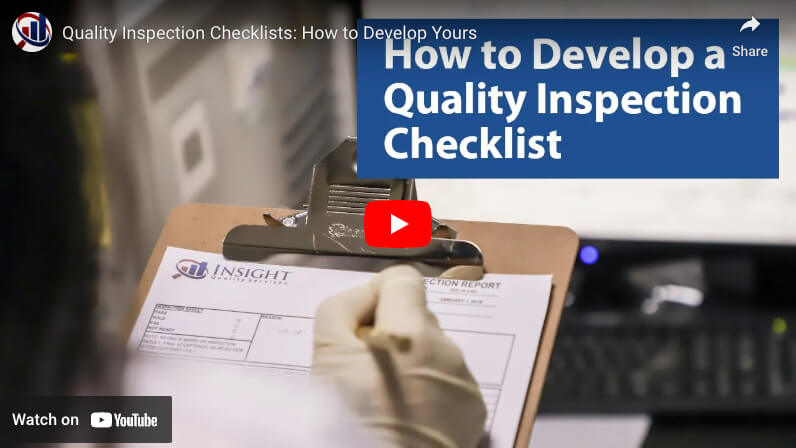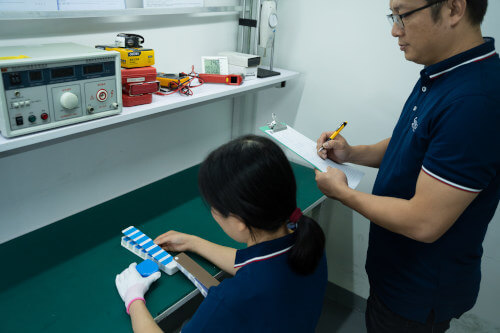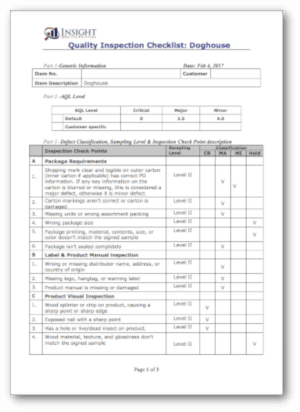

When you sell consumer products in the US or European market, working with manufacturers in low-cost countries can be fear-inducing. The possibility that you might randomly receive a shipment of substandard or unsafe products is like an ever-present shadow looming overhead.
It often makes sense to put your own quality control measures into place, which leads many importers to conduct product inspections at the factory. Whether someone on your team conducts these inspections or you hire a third-party QC company (like Insight Quality) to help you, it is essential to have an effective quality control inspection checklist.
This video and article talk about what a QC checklist is and how to create and organize one. You can download a free inspection checklist template below, which provides guidelines for inspecting a doghouse. Use this template to help you generate ideas for your checklist.
Table of Contents

Insight inspectors verifying carton weight and recording it on a quality control checklist
An inspection checklist serves as a guide for the person inspecting your products during a product quality inspection. Whether you go to the factory yourself to check the quality of your products or hire a third-party QC company to do so, the checklist tells the inspector what to look for.
A well-thought-out checklist gives you or the inspection service provider clear criteria to follow when checking your products. It also gives your manufacturer a set of specific standards to meet, and the increased accountability makes them more likely to produce goods that meet your expectations.
How do you go about creating your quality control checklist?

A shirt with incorrect sleeve lengths
Different types of products are prone to different defects. For example, if you’re making wooden furniture, you might be concerned about splinters, and if you’re selling electronics, you might be worried about incorrect voltage. Start by thinking about your product’s specific characteristics and what types of defects might occur with it.
If you need inspiration and have sold the product before, you can reference customer complaints and return data. If you haven’t, you can try looking through customer reviews for competing products. You should also consider any issues that you had with your samples during the sampling process.
Some defects are more severe than others — a wood splinter can cause injury, so it’s more severe than a small scratch or dent. Once you have a list of potential defects, you should divide them into three categories: minor, major, and critical defects. For more information about defect classification, read this article.
If you’re hiring a third-party inspection company (like Insight Quality), you should certainly consult with them to get an idea of the most common defects they put onto their checklists for similar products. However, keep in mind that inspection providers will specialize in different product categories, so if you’re asking for advice, be sure they have the relevant experience.
Also, keep in mind that you are (or should be) the expert on the specifics of your product, and you should never entirely hand this responsibility off to your third-party QC company. The development of your checklist should be a collaborative process because, as the importer, you are the one who is ultimately responsible for quality management and your product quality standards.

Insight inspectors verifying product color and recording it on a quality checklist
Your quality checklist will consist of different sections, and they should generally be similar to the ones in the following list. Depending on the type of product you have, you may not need to have all of these sections, or you may have more. The sections we typically include in our checklists are:
Now that you have an idea of the sections that go into a quality inspection checklist, let’s look at an actual example

To give you a concrete example, we’ve provided a sample quality inspection checklist for download. An inspector would use this checklist to conduct inspections on a wooden doghouse. Regardless of your product category, a lot of the information on this checklist is product agnostic. Use it for inspiration during the process of working on your own checklist.
If you want to ensure your products’ quality and avoid lousy product reviews and returns, a quality checklist is essential. It helps get you on the same page with your manufacturer and helps ensure products are made to your standards.
Use our doghouse checklist as a guide, and if you have any questions, leave a comment below or contact us directly.
Note: This article was originally published in February of 2018 and was updated in March of 2024.